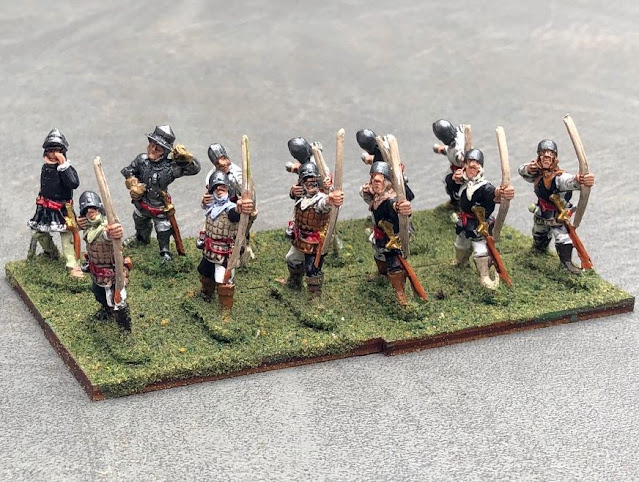 Just need to add one of the new banners from Pete's flags.
Just need to add one of the new banners from Pete's flags.
 These archers form a sister unit to a unit of Bills I did last year.
These archers form a sister unit to a unit of Bills I did last year.
Tomorrow several of us are to get together to do a playtest of my Wachau game, to be run Saturday night at Historicon. The scenario is based upon that in Leipzig, The Battle of the Nations: A Wargamer's Guide to the Battle of Leipzig 1813 by Rohan Saravanamattu, published by Helion and Company, Warwick, England, and adapted for the Battle Command rules by Brent Oman.
Battle of Leipzig October 16, 1813, Southern (Wachau) sector
1 Infantry unit = 75 figures in scenario (3000 Men), 1 Cavalry unit = 30 figures from scenario (1800 men), 1 Artillery unit = 4 guns from scenario (24 guns)
Army of Bohemia, Schwarzenberg LD 8
72 Morale Points
2nd Austrian Corps – Meerveldt LD 10
4 Austrian Line DD 6 CD 10
1 Austrian Light Cavalry DD6 CD 10
1 6# Foot Battery DD 6 CD 10
4th Austrian Corps – Klenau LD 8
5 Austrian Line DD6 CD 10
1 Grenz DD 6 CD 12
1 Austrian Light Cavalry DD 6 CD 10
1 Austrian Uhlan DD 6 CD 10
1 6# Foot Battery DD 6 CD 10
Austrian Reserve Corps – Hessen-Homburg LD 10
(arrives E1/D1 on first reinforcement card)
4 Austrian Line DD 6 CD 10
2 Austrian Grenadiers DD 8 CD 12
2 Austrian Cuirassier DD 8 CD 12
1 6# Foot Battery DD 6 CD 10
1 12# Foot Battery DD 6 CD 12
Russian Cavalry Division – Pahlen LD 10
1 Uhlan DD 6 CD 10
2 Russian Light Cavalry DD 6 CD 10
1st and 2nd Russian Corps – Gorchcov, Eugen von Wurttemburg LD 10
2 Russian Jager DD8 CD 10
6 Russian Line DD 8 CD 8
1 6# Foot Battery DD 6 CD 10
2nd Prussian Corps – Kleist LD 10
2 Prussian Line Infantry DD 6 CD 12
2 Prussian Reserve Infantry DD 6 CD 10
2 Prussian Landwehr Infantry DD 6 CD 8
1 Prussian Uhlan DD 6 CD 10
1 Prussian Landwehr Cavalry DD 6 CD 8
1 6# Prussian Foot Battery DD6 CD 10
Russian Grenadier Corps – Rajevsky LD 8
2 Russian Grenadiers DD 8 CD 12
1 Russian 12 # Battery DD 6 CD 12
Russo-Prussian Guard Corps – Yermalov LD 8
(arrives E1 on 2nd reinforcement card )
2 Russian Guard Infantry DD 10 CD 12
1 Prussian Footguards DD 8 CD 12
1 Russian Guard 12# Battery DD 8 CD 12+1
1st and 2nd Russian Guard Cavalry Divisions LD 10
1 Russian Guard Cuirassier DD 10 CD 12
1 Russian Line Cuirassier DD 8 CD 12
1 Russian Line 6# Horse Battery DD 6 CD 10
3rd and 4th Russian Cavalry Divisions LD 10
Russian Guard Hussars DD 10 CD 12
Russian Guard Uhlans DD 10 CD 12
Prussian Guard du Corps DD 10 CD 12
1 Prussian 6# Horse battery DD 6 CD 10
Cossacks – Platov LD 10
2 Cossacks DD 4 CD 8
Total: 38 Infantry, 17 Cavalry, 9 Artillery; 64 units
French Forces – Marechal Murat – Emperor Napoleon I LD 10
64 Morale Points
Old Guard – Friant LD 10
4 Old Guard Infantry DD 10 CD 12+1
1 Guard 12# Foot Battery DD 10 CD 12+1
Young Guard Corps – Marechals Oudinot & Mortier LD 12
4 Elite Young Guard DD 8 CD 12
1 Elite 6# Foot Battery DD 8 D 12
Guard Cavalry – Nansouty LD 10
1 Grenadiers a Cheval DD 10 CD 12+1
1 Chasseurs a Cheval DD 10 CD 12+1
1 Polish Lancers DD 10 CD 12+1
1 Dutch Lancers DD 10 CD 12+1
1 6# Guard Horse Artillery DD 10 CD 12+1
II Corps – Marechal Victor LD 8
1 French Legere DD 6 CD 12
3 French Line DD 6 CD 10
1 6# Foot Battery DD 6 CD 10
V Corps – Lauriston LD 8
1 French Legere DD 6 CD 12
4 French Line DD 6 CD 10
1 French Light Cavalry DD 6 CD 10
1 12# Foot Battery DD 6 CD 12
VIII Corps – Prince Poniatowski LD 12
4 Polish Line DD 6 CD 12
IX Corps – Marechal Augereau LD 10
4 French Line DD 6 CD 10
XI Corps – Marechal MacDonald LD 12
(arrives at I3 on 1st reinforcement card)
1 Legere DD 6 CD 12
2 French Line Infantry DD 6 CD 10
1 Westphalian Line Infantry DD 6 CD 8
1 Italian Line Infantry DD 6 CD 8
1 French Light Cavalry DD 6 CD 10
1 6 # Foot Battery DD6 CD 10
1st Cavalry Corps – Latour Mauborg LD 10
Combined Light Cavalry Division – Chastel LD 8
2 French Light Cavalry DD 6 CD 10
1st Heavy Cavalry Division – Bourdesoulle LD 10
2 French Cuirassier DD 8 CD 12
1 6# Horse Battery DD 8 CD 12
3rd Heavy Cavalry Division – Doumerc LD 10
2 French Cuirassier DD 8 CD 12
2 Dragoons DD 6 CD 12
2nd Cavalry Corps – Sebastiani LD 12
(arrives J3 on 1st reinforcement card)
2 French Chevau-Leger Lanciers DD6 CD 10
1 Carabiniers DD 8 CD 12
4th (Polish) Cavalry Corps – Sokolnicki LD 8
1 Polish Chassuer DD 6 CD 10
1 Polish Lancer DD 6 CD 12
1 Polish Horse Artillery DD 6 CD 10
5th Cavalry Corps – Pajol LD 8
2 French Dragoons DD 6 CD 12
32 Infantry, 21 Cavalry, 8 Artillery; 61 units
Troop Deployment for the game
Snappy Nappy Campaign-in-a-Day 2022: The Aftermath